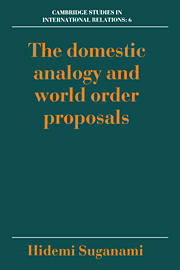Book contents
- Frontmatter
- Contents
- Acknowledgements
- Introduction
- 1 The domestic analogy debate: a preliminary outline
- 2 The range and types of the domestic analogy
- 3 Some nineteenth-century examples
- 4 Contending doctrines of the Hague Peace Conferences period
- 5 The impact of the Great War
- 6 The effect of the failure of the League on attitudes towards the domestic analogy
- 7 The domestic analogy in the establishment of the United Nations
- 8 The domestic analogy in contemporary international thought
- 9 The domestic analogy and world order proposals: typology and appraisal
- Conclusion
- Notes
- References
- Index of personal names
- Subject index
4 - Contending doctrines of the Hague Peace Conferences period
Published online by Cambridge University Press: 18 December 2009
- Frontmatter
- Contents
- Acknowledgements
- Introduction
- 1 The domestic analogy debate: a preliminary outline
- 2 The range and types of the domestic analogy
- 3 Some nineteenth-century examples
- 4 Contending doctrines of the Hague Peace Conferences period
- 5 The impact of the Great War
- 6 The effect of the failure of the League on attitudes towards the domestic analogy
- 7 The domestic analogy in the establishment of the United Nations
- 8 The domestic analogy in contemporary international thought
- 9 The domestic analogy and world order proposals: typology and appraisal
- Conclusion
- Notes
- References
- Index of personal names
- Subject index
Summary
The aim of this chapter is to examine the effects of the development of international law, and relative peace, at the turn of the century upon the use of the domestic analogy in proposals for world order. In the first part of this chapter, we shall examine the ideas of Walther Schücking, a Marburg Professor of International Law, and those of his Cambridge counterpart, Lassa Oppenheim. These writers' views illustrate in a striking manner the impact of the contemporary international and domestic situations on the use of the domestic analogy.
Later in this chapter, we shall study writers on international law who appear to have belonged to Oppenheim's ‘diplomatic school’. These were Oppenheim's contemporaries, and wrote from the same historical background of progress in international law. Yet, as we noted, this school was said by Oppenheim to be opposed to the development of international law along the lines of municipal law.
As it turns out, apart from one possible exception, none of the authors whom Oppenheim may have considered as belonging to this school was well known or influential. None the less, we shall discuss the views of those authors so as not to lose sight of the fact that the development of international law at the turn of the century did not necessarily produce a uniform response among international lawyers in favour of a further approximation of international law to municipal law than it had already accomplished by that stage.
- Type
- Chapter
- Information
- The Domestic Analogy and World Order Proposals , pp. 62 - 78Publisher: Cambridge University PressPrint publication year: 1989

